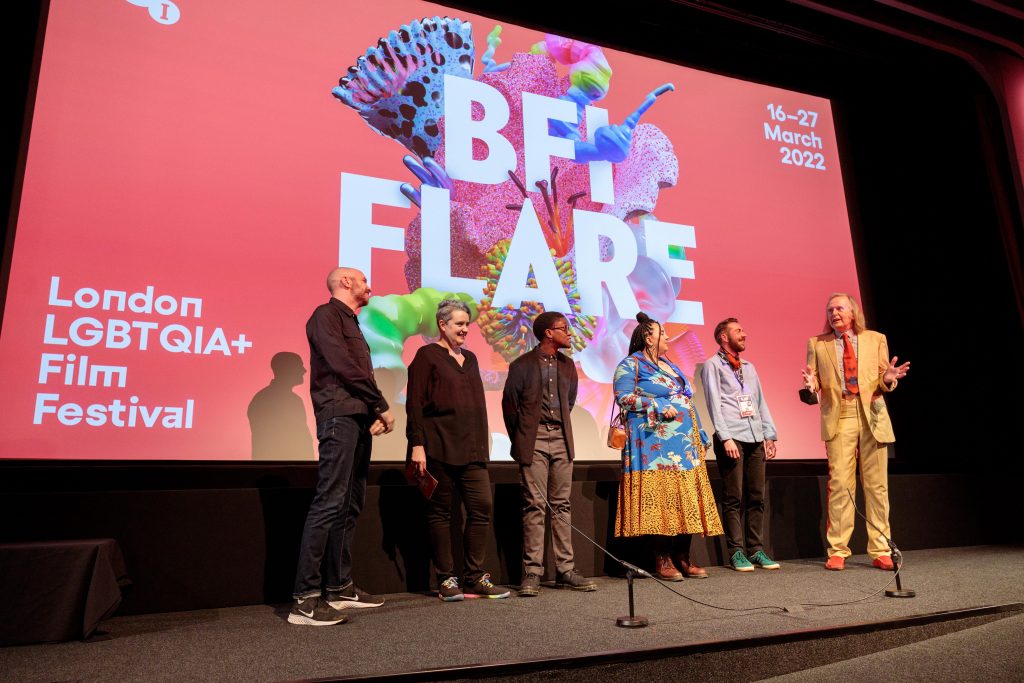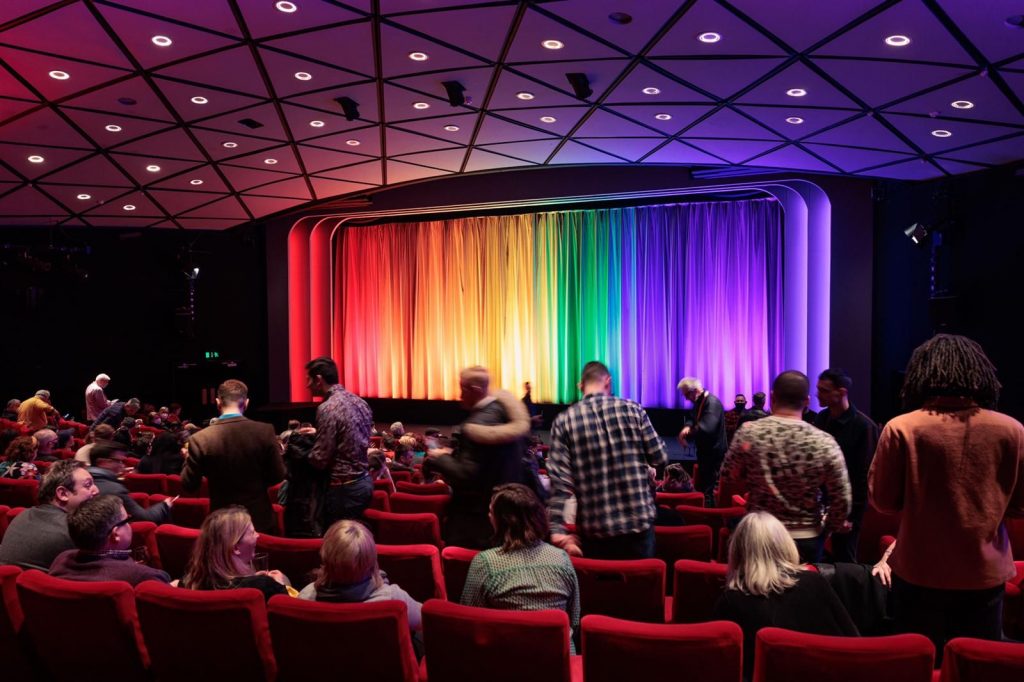“With a little imagination, you can change people’s lives.”
BFI Flare – the London LGBTQIA+ Film Festival – is renowned for screening the best in contemporary LGBTQIA+ cinema from around the globe. Ahead of this year’s event taking place on 15-26 March, we were lucky enough to speak with programmer Brian Robinson who takes us behind the scenes of the programming process, explores the history of the festival, and shares his top tip for getting the most out of your experience.
What can we expect from this year’s BFI Flare?
We’re at a key moment in history, coming out of the pandemic and we’ve had two years where we’ve done mainly an online festival. Last year was a hybrid and this year we will still have some online aspects, but the majority of screenings will be live and in person. I still feel a bit giddy and excited about the possibility of being in a room with a filmmaker and an audience because it’s a very different aesthetic experience, a supercharged viewing experience. When you’re watching something funny at home, your lip might curl a little, but an audience will generate laughter and all the reactions are heightened. It’s a fantastic thing to share these amazing things on screen – stories, and dramas, they take you places you’ve never been to and that’s one of the things that we look for in the stories we chose. There used to be a kind of cliché of what gay cinema was about and usually, it was two white men who were relatively young and wanted to have sex or spend the whole film thinking about it, but I think we are now in a much more mature era of film making and we’re getting complicated multi-layered stories which aren’t just boy meets boy.

How long have you worked on BFI Flare?
23-24 years but I was at the first-ever edition of the festival in ‘96 programmed by a man named Richard Dyer – that was a bit of a life changer for me. I’ve grown up with the festival in all its different forms, so it was initially called Gays’ Own Pictures then it became The London Lesbian and Gay Film Festival and then we became BFI Flare, but we just really wanted to reflect the diversity of the material that we were dealing with.
Other than the name, what other most significant changes have you seen in the festival?
I think just the range and diversity of both audiences and films have really increased. In the 80s, there was still a reluctance to be in such a public space – it was still seen as something a little bit brave to do and I think the world has changed immeasurably in the last however many years it’s been, and I think the festival reflects that. The first festival was nine films over seven days and now we have somewhere in the range of about 55 feature programs and well over 100 shorts and maybe some extra archives and events. The audiences are over 20,000 so it’s a big and important cultural event that is viewed across the world. If you have a film in our festival, you will be invited to hundreds of festivals around the world. We know just from experience that that’s what happens, so we are a portal to the rest of the world.
What is involved in the programming process for BFI Flare?
Between December and now, we have just been watching hundreds of films which is often quite a depressing activity but it’s like mining for gold. You have to go through a lot of stuff and then when you find a nugget, you’re gripped, and you think, ‘I can’t wait to show this to an audience’. Audiences can really surprise you with how they react to things though. Something you thought was quite interesting, quite compelling, but maybe in discussion one or two of the other programmers don’t really love, people will just go mad for, and will come up and say, ‘Thank you so much for programming that film, it’s the best I’ve ever seen, this is amazing’. Not everyone’s tastes are the same, so we sometimes have to negotiate with each other and it’s a very creative process. It’s heartbreaking though when a film that you absolutely love doesn’t always sell tickets. It’s just a programmer’s joy and tragedy that they don’t always work in the way that they were expected to.
What do you think of the theme of this LGBTQIA+ History Month, Behind the Lens?
I think it’s fantastic – history lives and breathes on the screen there’s no better way to understand who has been there before us. Every day should be a lesbian and gay history day because there’s so much history out there to discover. For anyone who’s interested, BFI Player has a huge number of films – lots of which are free – from the archives. There are old TV, dramas, activist films and documentaries and it’s amazing as a resource that anyone can tune in to – all you need is the internet. There’s an incredible range of stories from our past that are often unsung, unheard, and untold, and when you find a filmmaker who has the ability to tell that story in a dynamic and visually exciting way, it’s absolutely thrilling. You get to be inside the heads of people who have lived maybe 100 years ago.
I can imagine it’s a very unifying environment.
You’re all there for a reason – because you’re interested in LGBTQIA+ culture. Some people bring a straight friend so it’s very interesting to open these conversations. When you come out of a film that you’ve really loved, you want to say something about it and people will overhear and join in, often relationships begin because people talk after screenings. There’s no difficulty in just turning to someone and saying, ‘what did you think of the film?’ Or ‘what have you seen?’ It’s a very chatty festival and it’s nice to be in that environment.

Can you tell us a bit about the Five Films for Freedom partnership with the British Council?
Five Films for Freedom is an amazing project. If we screen films to 20,000 people, we know that Five Films for Freedom have been screened literally millions of times across the world. The films are hosted by the British Council, and they can tell which countries have viewed the films, many of which have been viewed in countries which have the death penalty for homosexuals which is very humbling to know people will take that risk. There was somebody during the Afghanistan war who at 2am, in the middle of the desert, had viewed one. It’s a great way of sharing films with the world and it’s a great way of getting people to discuss what it means to be gay in the 21st century. It’s an incredible project and it has an amazing reach and depth – it’s really good visibility for filmmakers to be seen all across the world and we are delighted to be a part of it.
What are your top tips for getting the most out of this year’s festival?
People sometimes get the impression that every film has sold out, often even if it says it’s sold out online, there are tickets released on the day and it’s always worth – if you’re within easy reach of London – dropping by to see what’s available an hour before and play festival roulette. Keep an eye on the website for more updates ahead of the event, the programme is announced on the 15 of February and tickets go on sale to non-members I think on 24 February.
What has your involvement in BFI taught you?
So many things, Flare shaped my life and I live for the cinema. I think what I’ve learnt is that there’s an astonishing amount of creativity in the queer community and when the resources are there, with a little imagination you can make something that can change people’s lives.

